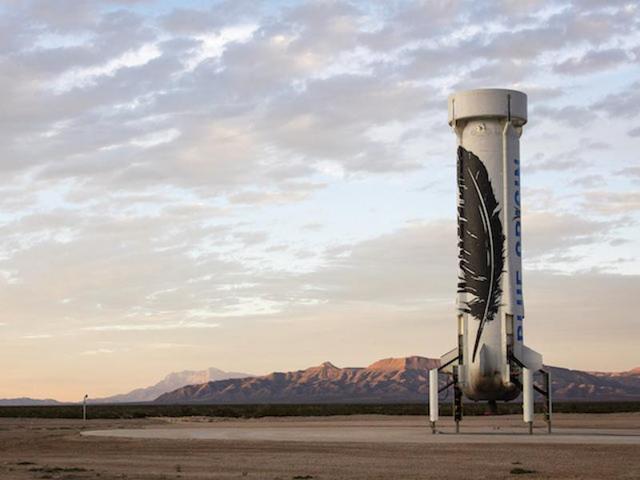‘Gamechanger’: First-ever reusable rocket returns safely from space
Amazon founder Jeff Bezos’ private spaceflight company, Blue Origin, announced on Tuesday morning that it has successfully landed its main rocket, New Shepard, back on Earth after launch. This makes it the first ever rocket to have landed intact after taking off, hinting at a potential game changer in space technology – a commercially viable reusable rocket.
Amazon founder Jeff Bezos’ private spaceflight company, Blue Origin, announced on Tuesday morning that it has successfully landed its main rocket, New Shepard, back on Earth after launch. This makes it the first ever rocket to have landed intact after taking off, hinting at a potential game changer in space technology – a commercially viable reusable rocket.

“Now safely tucked away at our launch site in West Texas is the rarest of beasts — a used rocket,” Bezos said in a statement. “Blue Origin’s reusable New Shepard space vehicle flew a flawless mission — soaring to 329,839 feet and then returning through 119-mph high-altitude crosswinds to make a gentle, controlled landing just four and a half feet from the centre of the pad. Full reuse is a game changer, and we can’t wait to fuel up and fly again.”
Currently all rockets that are launched into space are either destroyed upon re-entry, or are unrecoverable – the reason for the significantly high cost, as a brand new rocket has to be built for each subsequent flight. Private space exploration firms have been trying to develop rockets that would at least be partially recoverable to reduce manufacturing costs, but none have been successful – until now.
Blue Origin’s announcement on Tuesday morning was accompanied by a highly stylised video of the landing. While the video comes across as a Hollywood-esque blockbuster, interspersing actual footage with CGI images, it provides a fair understanding of the tech behind the achievement.
New Shepard, named in honour of Alan Shepard, the first American to make it to space, is shown climbing to an altitude of 329,839 feet — or sub-orbital space — before detaching the vehicle’s crew capsule. If people had been on board, they would have experienced approximately four minutes of weightlessness before falling back to Earth. The crew capsule is designed to safely land any future passengers via a series of parachutes.
The secret to the potentially game-changing landing is in the technology underneath the rocket’s fuselage, which is designed to make a soft landing. Blue Origin’s rocket utilises a technique known as propulsive landing, which essentially involves reigniting its engines as it falls back to Earth. The engines help control the rocket’s descent, and ensure that the vehicle stays upright so it lands on the ground vertically.
Blue Origin’s triumph, however, needs to be taken with a pinch of salt.
There is a significant difference between the terms “orbit” and “space,” as Elon Musk, founder of SpaceX, which has been attempting to soft-land its Falcon 9 rocket for the past year, pointed out in a tweet congratulating his rival.
The point essentially is this: while it is relatively easy getting into space (it is only about 100 km above the surface of the Earth), staying there is an entirely different matter altogether.
The gravitational pull in sub-orbit – which is where New Shepard reached – is almost as strong as what we experience on the surface of the planet, meaning that objects there will eventually fall back down to Earth. Falcon 9, on the other hand, is aiming to deliver payloads into the Earth’s lower orbit.
So while New Shepard may hint towards a viable model of a reusable rocket, there still needs to be a lot of work done before it can stay in space, which requires an outrageous amount of fuel and tech designed to withstand an orbital speed of 8 km/s needed to remain in orbit.
Nonetheless, the successful soft launch hints at an exciting new phase of development in space technology, making the possibility of private space exploration even more feasible now.




